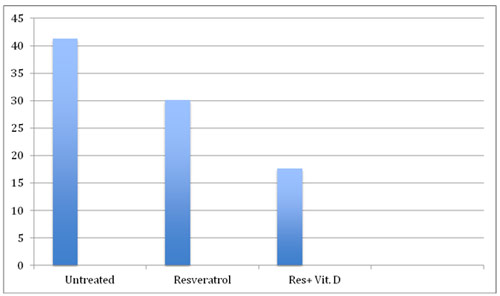ResveratrolConsumer
avert online
consumer fraud
ResveratrolQuiz
test your knowledge
New E-Book
How the world got lost on
the road to an anti-aging pill
Subscribe to our newsletter to receive email notifications when new articles are posted.
January 19, 2016: by Bill Sardi
Cardiac researchers writing in the International Journal of Vitamin Nutrition Research report the combination of low-doses of the red wine molecule resveratrol plus vitamin D results in profound prevention of heart muscle damage following an experimentally induced heart attack in animals.
The area of scarring (fibrosis) of heart muscle tissue was reduced from 41.3% in untreated animals to 30.1% (28% reduction) in resveratrol-treated animals and an astounding 17.6% in animal treated with low-dose resveratrol + vitamin D (57% reduction!). This report is groundbreaking and unprecedented. It could signal a new era in preventive heart care far above what a daily aspirin tablet offers.
Laboratory mice were pre-treated for 14 days with low-dose resveratrol (human equivalent of 70 mg/day) and vitamin D. The protective effect was attributed to a dramatic rise in catalase, an internal enzymatic antioxidant. Resveratrol increased catalase activity by 55.3% versus 122.0% for resveratrol + vitamin D.
This research validates the work of Dipak Das PhD (deceased), whose earlier reports showed that relatively low-dose resveratrol works in a superior manner over mega-dose resveratrol to prevent heart muscle damage during a heart attack. Dr. Das showed that doses of resveratrol equivalent to 1750 milligrams in humans“killed”the rodent heart.
Immediately following the intentionally-induced heart attack where blood supply was cut off in these laboratory animals, the number of abnormal heart beats was also dramatically reduced, from 334 to 274 with resveratrol and 179 with resveratrol + vitamin D.
Researchers said “Our study showed that combination of low-dose vitamin D plus low-dose resveratrol can be a novel and effective strategy for protecting the heart against impaired blood supply (ischemia).”
This laboratory report will likely be criticized for not being a human study, but it is ethically impossible to intentionally create mortal heart attacks in humans for experimental purposes.
It appears resveratrol may be able to save more lives than a baby aspirin that millions of Americans take every day to prevent blood clots in coronary arteries. Resveratrol also inhibits clumping of blood platelets and blood clots in the four coronary arteries that supply oxygenated blood to heart muscle.
In practical terms, if what has been demonstrated in the animal lab applies to humans, a person taking a modest dose of vitamin D + resveratrol would survive even the most severe heart attack with minimal heart muscle damage. Millions more heart muscle cells would survive the event rather than die off and produce scar tissue.
The heart muscle cells you were born with are still pumping blood and are not rapidly replaced. So it is extremely important to protect heart muscle cells from damage should a blockage of blood circulation occur.
Longevinex®, a commercially available dietary supplement, provides low-dose resveratrol + vitamin D.
©2016 Bill Sardi, ResveratrolNews.com

Percent (%) area of damage to heart following an experimentally induced heart attack in laboratory animals.
Posted in Resveratrol
Add comments »